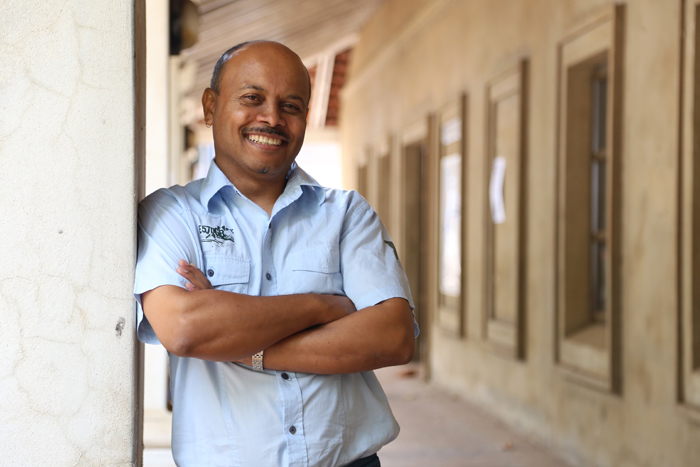Mellon fellows grapple with blackness at UCT
13 April 2016 | Story by Newsroom
Dr Gideon Nomdo has been a Mellon co-ordinator since the Mellon Mays Undergraduate Fellowship (MMUF) Programme was formally established at UCT in 2002. Having being funded by the Mellon Foundation himself, Nomdo unpacks the idea behind the programme that aims to boost the numbers of black academics at UCT.
“The competition this year was out of this world,” says Nomdo about the 2016 MMUF cohort. “It's getting tougher every year. They're well read, articulate and they've thought about what they want to do after the graduate degree.”
The Mellon Mays Undergraduate Fellowship Programme aims to recruit young black students into academia. The American programme branched out to South Africa and has been running at UCT since 2002. Each year five students are selected as Mellon Undergraduate Fellows.
“Issues of race and identity are huge items on Mellon's agenda,” explains Nomdo, who lectures in the Centre for Higher Education Development.
MMUF is open to students who are entering the final year of a three-year degree or the third year of a four-year degree. Students in a three-year degree are expected to apply for an appropriate honours programme. Southern African Development Community students are also welcome to apply.
Students interrogate their identity
The fellowship pushes its fellows to think out of the box and deal with identity issues both from a UCT and a South African context. “It's quite interesting to see how they [the students] unpack issues of how they identify as black,” says Nomdo
In 2004 MMUF started admitting coloured and Indian students, which has added diversity to the cohort and has made the programme more dynamic.
“The success of the MMUF programme depends on the success of the cohort; it's just five students and we've got them for two years,” Nomdo says.
“In the first few years, it was very interesting to see how coloured students identify and how black African students identify as black in terms of the South African context,” says Nomdo.
He infuses identity politics into his teaching as a matter of course, be it a language course or gender studies module. “We get students to think very carefully about what it means to be a future black academic,” he says.
Belgravia to UCT via Simon's Town
Nomdo is a teacher by training and trade, so it's little surprise that he revels in nurturing young scholars.
But his was not a linear trail from Belgravia High School. After matriculating in 1984, Nomdo had ambitions to be a toolmaker.
“My friends were toolmakers and they were driving fancy cars, so I figured I wanted to be one too,” he grins. So off he went to the Simon's Town naval dockyard to learn the trade.
“Lucky for me, the toolmakers' shops were crowded!” he laughs. But it was after spending six months hammering out ship parts in a blacksmith's workshop that he baulked at the idea of spending the rest of his life making tiny metal springs.
So Nomdo enrolled at Hewat, the teacher training college in Athlone, and completed a Higher Diploma in Education. Thereafter he spent “the best two years” of his life teaching at Turfhall Primary.
His UCT journey began with an undergraduate degree in 1992, and it continues.
He was funded from honours through to master's level by the Mellon Foundation and, had he not landed a teaching post, they would have funded his doctoral studies too.
“The proposal was already accepted, and all I had to do was complete the writing,” he says. But the peace of mind of a steady job won the day, and Nomdo has been teaching and researching since then. He completed his PhD in December 2015.
“My case studies for my PhD were MMUF students, so this made my research really meaningful for me,” says Nomdo.
He has taught in the humanities faculty's Academic Development Programme since 1999 and became a Mellon co-ordinator at UCT in 2002.
MMUF's mission at UCT is to nurture Mellon fellows' aspirations of embarking on a career in academia and to increase the number of black professors. It's about correcting historical disadvantage, says Nomdo, and with South Africa's legacy of apartheid, the five students selected each year are all from historically disadvantaged backgrounds.
“It's all about how one navigates and negotiates their identity in the institution,” says Nomdo.
These students are each assigned a mentor of their choosing, and this established academic guides them through their final undergraduate year and first year of postgraduate work.
Having a mentor for two years helps to “demystify academia” for up-and-coming scholars, says Nomdo. As does being whisked off to regular workshops and conferences locally and internationally, and presenting research papers to critical peers.
“Very often when you enter academia you don't really know what's happening behind the scenes, what professors are actually doing. Once Mellon students reach the lecturer level, they've seen it all,” he says.
Story Yusuf Omar and Chido Mbambe. Photo Yusuf Omar.
 This work is licensed under a Creative Commons Attribution-NoDerivatives 4.0 International License.
This work is licensed under a Creative Commons Attribution-NoDerivatives 4.0 International License.
Please view the republishing articles page for more information.










